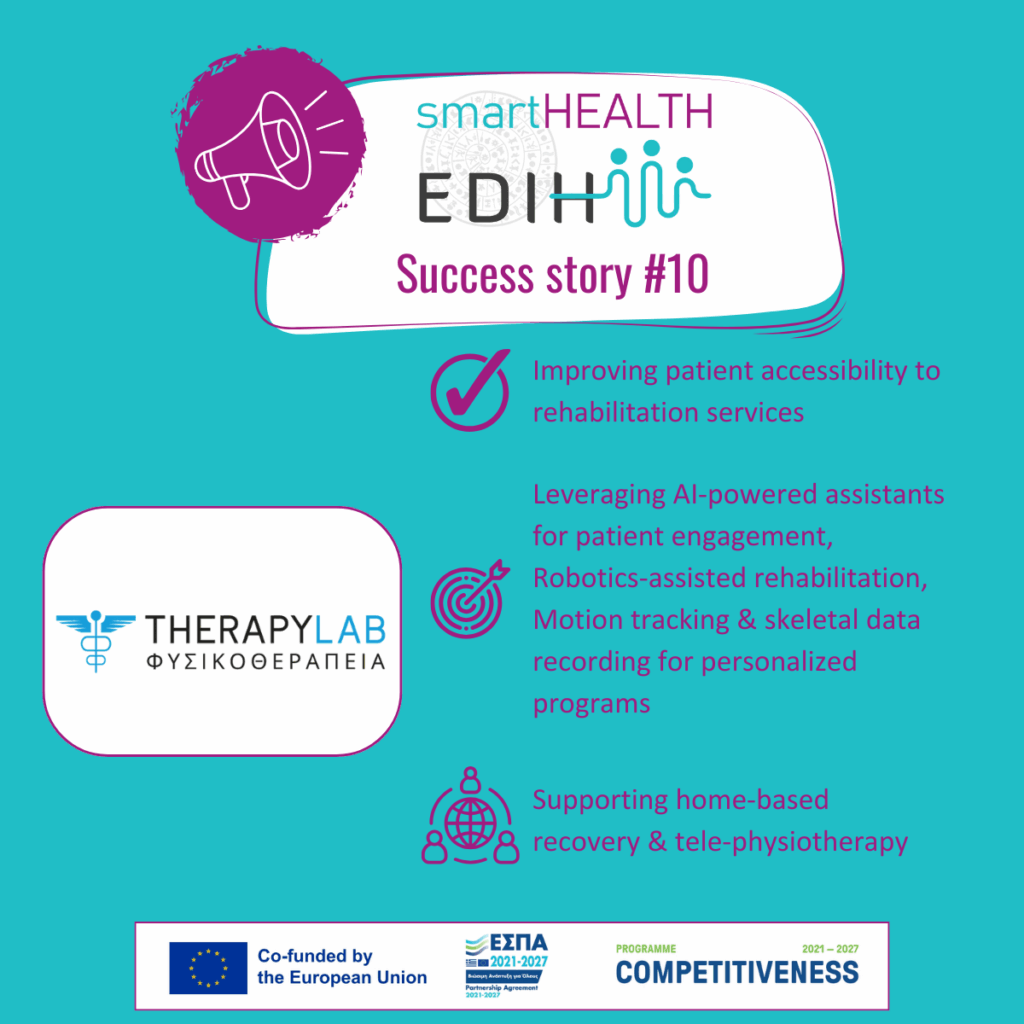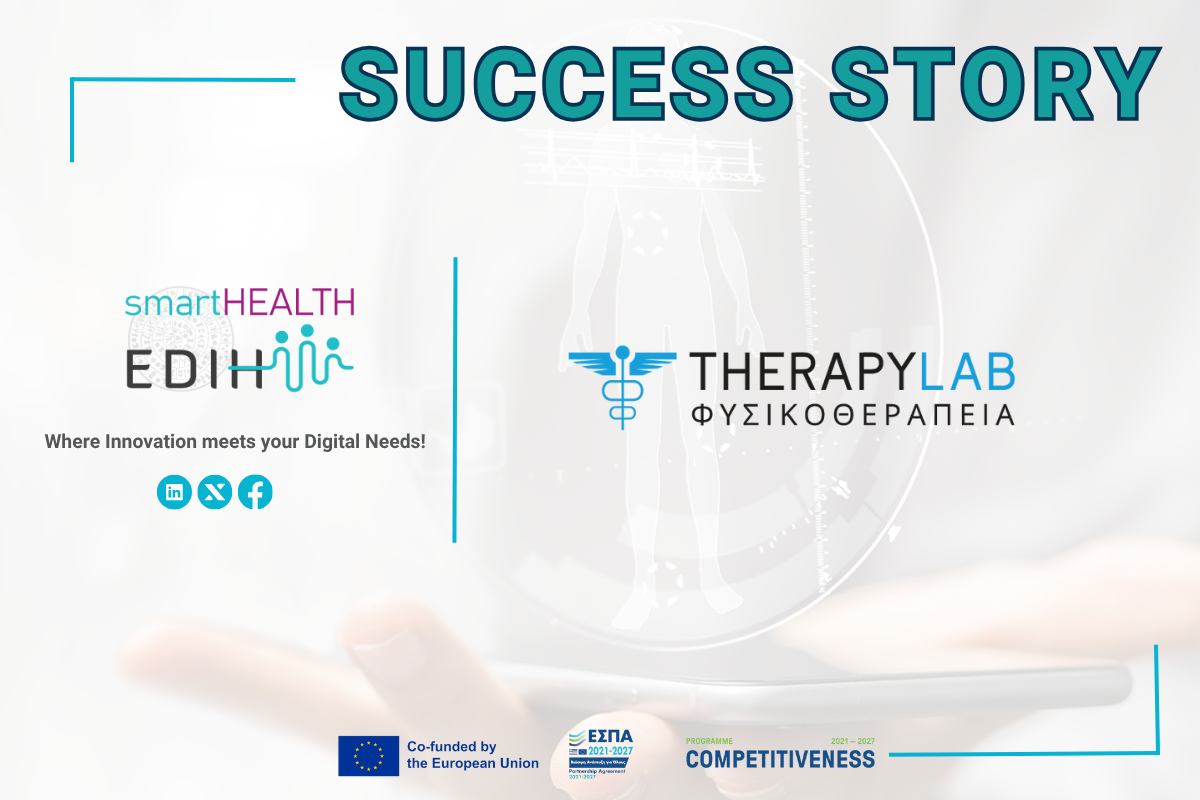TherapyLab Success Story: Clinical monitoring and effective patient communication
We are happy to present the successful collaboration between TherapyLab and smartHEALTH. Through this partnership, TherapyLab effectively addressed its digital challenges and needs, namely to be informed on the existence of useful applications and practices that enhance and improve patient accessibility to its services, facilitate the corresponding services with the use of Artificial Intelligence tools, as well as support home rehabilitation and telephysiotherapy as an intervention method both in areas with limited access and between in-person physiotherapy sessions.
Key Information
TherapyLab provides Physical Therapists with the opportunity to start their business activities in healthcare through the application of a fully organized franchising system, under the constant scientific and administrative guidance of experienced professionals. It ensures the consistent high quality of the services provided through the system of constant training, the organization and participation in seminars, and by closely attending all activities of the franchisee. Through specialized sales and marketing techniques, the system approaches all stakeholders of the healthcare chain and secures a steady flow of patients/customers maximizing economic results for the franchisee’s business.
- Technologies Used: Human-centric design, Human Machine Communication
- Collaboration Period: September 2024 – November 2024, February 2025 – September 2025
- Services Provided: IT services, rehabilitation services using robotic assistants and consulting services

The Challenge
During the first stage of the collaboration between the Department of Embodied Interaction and Robotics in the Institute for Language and Speech Processing (ILSP) (a leading R&D institute within the “Athena” Research and Innovation Center in Information, Communication and Knowledge Technologies) and the TherapyLab, the following basic needs emerged, which were able to be covered by the action of the smartHEALTH hub. Specifically, the needs included information on the existence of useful applications and practices that enhance and improve patient accessibility to the services of the TherapyLab physiotherapy laboratories, facilitate the corresponding services with the use of Artificial Intelligence tools, as well as support home rehabilitation and telephysiotherapy as an intervention method both in areas with limited access and between in-person physiotherapy sessions.
The Solutions
In order to address the TherapyLab’s needs in the areas of patient accessibility to laboratory services, the use of Artificial Intelligence (AI) tools during therapeutic practice and in home rehabilitation and telephysical therapy, the ILSP Researchers held a series of informative and educational seminars and demonstrations of indicative tools and applications. Specifically, indicative environments were presented for the accessibility of patients with motor and mild cognitive impairments to rehabilitation services using robotic assistants. TherapyLab was also informed about current technologies for accessibility to content by specific population groups, such as the blind, deaf and hard of hearing, while solutions using AI tools, such as chatbots and virtual assistants, were also presented. Finally, consulting services were provided in the field of effective monitoring of patient performance during the execution of telephysiotherapy programs, with reference to motion monitoring and skeletal data recording technologies as well as the creation of personalized physiotherapy rehabilitation programs.
The Implementation
The methodology that was followed during the collaboration between the ILSP Researchers and the TherapyLab included a series of meetings, both in person (at TherapyLab premises) and via the internet at regular intervals, in order to effectively monitor the progress of the collaboration between them. In the first stage, the procedures and practices followed by TherapyLab during the execution of its activities were investigated and the corresponding needs were jointly identified. After a study of the specific needs by the ILSP Researcher’s team, the content of the next phase of meetings was decided, which was of an informative nature. During this phase, the presentations and demonstrations of the solutions presented in the previous section were carried out. As part of the methodology, the stages of this collaboration were captured and recorded in the required reports (digital readiness report, description of the provision of solutions). In addition to the consulting activities, the methodology also included an on-site study of the Therapy’s professional space with the aim of investigating the possibility of creating multimedia material and its possible use in exercises and physiotherapy rehabilitation programs (distances for video recordings, lighting, sound reflections).
Lessons Learned
The main element that facilitated the collaboration between the ILSP Researchers and the TherapyLab was the regular communication between the two, especially when it was carried out in person. One option that we would not repeat was the long-term remote meetings, as it was found that they did not facilitate communication. Both the personal contact and the observation of the recipient and his associates in real working conditions enabled the service provider to confirm but also to deepen the specification of his needs, resulting in a more immediate and more effective provision of the service as a whole. An additional element that facilitated communication was the timely and appropriate information given to the associates who participated in the counseling and demonstration sessions, so that they would be able to integrate the result of these sessions in a manner corresponding to the quality of the services of the TherapyLab center. At the same time, both the ILSP Researchers and the TherapyLab were able to make the most of the infrastructure and support of the smartHEALTH network.
Follow “smartHEALTH” on social media for the latest news and updates: Facebook, LinkedIn, Χ.

